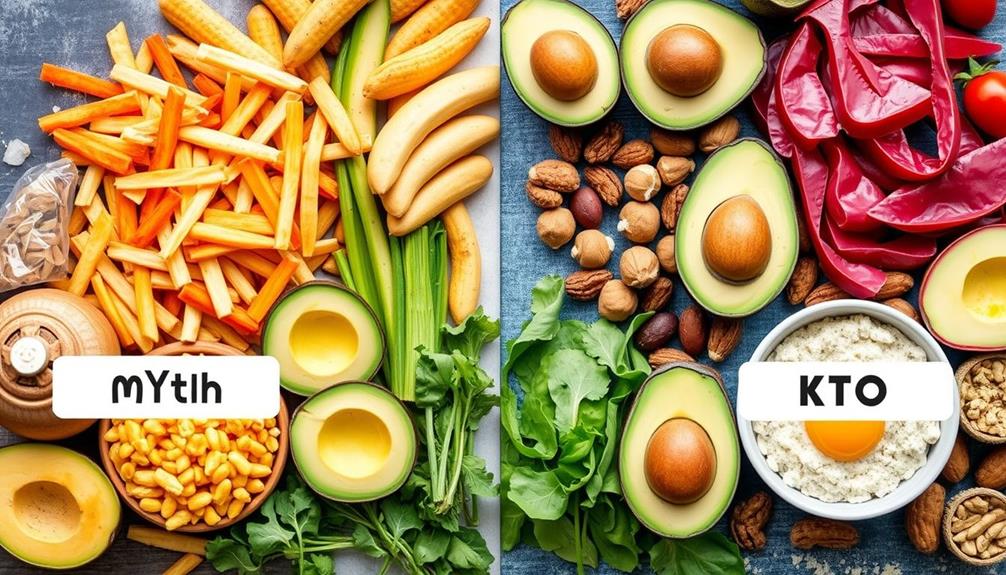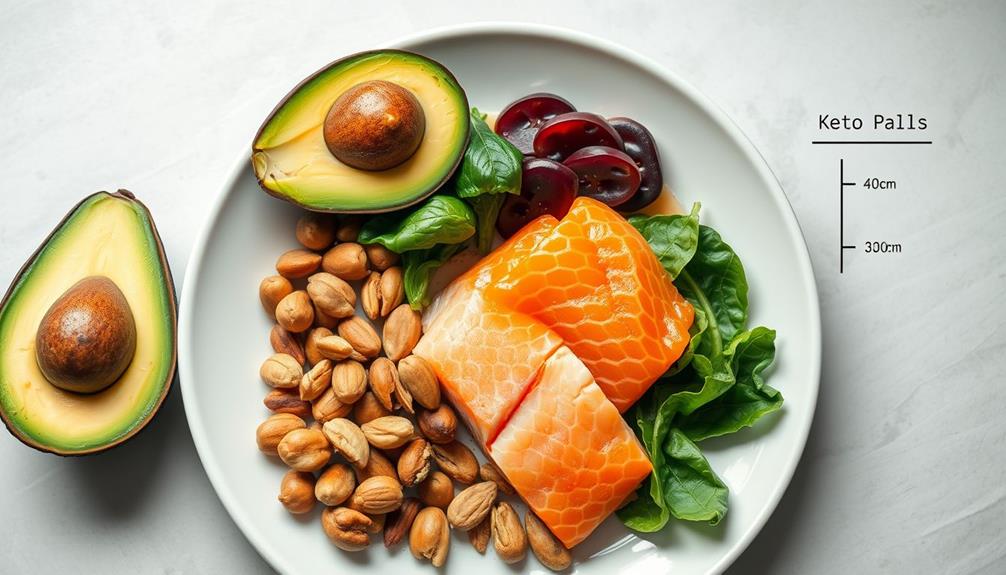You might have heard some wild claims about the keto diet, but many of those myths simply aren't true. For instance, the keto diet can actually improve heart health when you choose quality fats, like avocados and olive oil. It's also not just for weight loss; it can boost your mental clarity and stabilize blood sugar too. Sure, sticking to it can seem tough at first, but meal planning and community support make it easier. If you're curious about the real benefits and how to effectively navigate common challenges, there's much more to explore.
Key Takeaways
- Keto is Unhealthy: Contrary to belief, the keto diet can improve heart health by incorporating healthy fats like avocados and olive oil.
- Keto is Too Difficult: With proper meal planning and community support, adhering to the keto diet becomes manageable and sustainable.
- Keto is Only for Weight Loss: The keto diet supports cognitive function and stabilizes blood sugar, offering benefits beyond just weight loss.
- Keto Causes Nutritional Deficiencies: A well-planned keto diet, rich in low-carb vegetables, ensures adequate nutrient diversity and prevents deficiencies.
- Keto Flu is Inevitable: Initial fatigue and cravings are normal; staying hydrated and replenishing electrolytes can ease the transition into ketosis.
Understanding the Keto Diet

When it comes to understanding the Keto diet, think of it as a low-carb, high-fat eating plan that shifts your body into a state of ketosis. In this state, your body burns fat for energy instead of carbohydrates, leading to effective weight loss.
Typically, the macronutrient ratios consist of 70-75% fats, 20-25% protein, and very low carbohydrates (under 50 grams per day). You'll want to focus on healthy fats like those from avocados, olive oil, and fatty fish while selecting high-quality protein sources.
Monitoring your intake is essential to maintain ketosis, so keep track of what you eat. With the right approach, you can embrace this dietary shift and enjoy its potential benefits for your overall health.
Health Benefits of Keto

The Keto diet offers several compelling health benefits that go beyond weight loss.
By adopting this low-carb, high-fat eating plan, you can experience a range of positive changes in your body and mind.
Here are four key benefits you might notice:
- Improved Blood Sugar Control: You may see better fasting glucose levels, which is especially beneficial for managing diabetes.
- Increased Energy Levels: Once your body adapts, you'll likely feel more energized throughout the day.
- Enhanced Mental Clarity: Many people report sharper focus and improved cognitive function on a keto diet.
- Reduced Inflammation: This diet can help lower inflammation markers, promoting overall health and well-being.
Embracing the Keto diet could lead to these valuable health improvements.
Common Myths Explained

While the Keto diet offers impressive health benefits, misconceptions about it can lead to confusion and hesitation.
One common myth is that the Keto diet is unhealthy. In reality, when done right, it can improve heart health by focusing on healthy fats.
You might also hear that the Keto diet is too difficult to follow. Sure, the shift can be tough, but meal planning and support can make it manageable.
Another myth is that Keto is solely for weight loss; it can also enhance cognitive function and stabilize blood sugar.
Macronutrient Ratios for Success

Achieving success on the Keto diet hinges on understanding the right macronutrient ratios. To maintain ketosis and reap the benefits, focus on these key ratios:
- Fats: 70-75% of your daily caloric intake should come from healthy fats like avocados, olive oil, and nuts.
- Protein: Aim for 20-25% of your calories from moderate protein sources, such as meat, fish, and eggs.
- Carbohydrates: Keep your carb intake below 50 grams per day, prioritizing low-carb vegetables.
- Quality: Choose high-quality, nutrient-dense foods to support your health while adhering to these ratios.
Strategies for Sticking to Keto

Understanding the right macronutrient ratios lays a strong foundation for your success on the Keto diet, but sticking to it requires practical strategies.
Start by tracking your macronutrients to guarantee you're staying within your carb limits and hitting your fat and protein targets. Focus on whole, nutrient-dense foods, as they'll keep you fuller and provide essential nutrients.
Staying hydrated is vital, especially during the initial adjustment phase; drink plenty of water and consider electrolyte-rich foods.
Listen to your body's hunger cues and energy levels to personalize your meals.
Finally, connect with keto communities for support and recipe ideas, making the journey more enjoyable and sustainable.
These strategies will help you maintain commitment and enjoy the benefits of the Keto diet.
Addressing Nutritional Concerns

Addressing nutritional concerns is essential for anyone considering the Keto diet, as misconceptions can lead to unnecessary fears.
It's vital to understand that, with the right approach, you can maintain a balanced diet while enjoying the benefits of ketosis.
Here are four key points to keep in mind:
- Macronutrient Balance: Aim for 70-75% fats, 20-25% protein, and less than 50 grams of carbohydrates daily.
- Healthy Fats: Focus on sources like avocados, nuts, and olive oil to support heart health.
- Quality Protein: Choose high-quality meats, fish, and eggs, avoiding excess protein that can disrupt ketosis.
- Nutrient Diversity: Incorporate low-carb vegetables to prevent nutrient deficiencies and promote overall health.
Overcoming Initial Challenges

Starting the Keto diet can feel intimidating, especially when facing initial challenges like the "keto flu" or adjusting to a significant dietary shift.
To overcome these hurdles, stay hydrated and replenish electrolytes with foods like avocados, nuts, and bone broth, which can alleviate symptoms.
Gradually reducing carbohydrates instead of an abrupt change can help your body adapt more smoothly.
Create a meal plan focusing on whole, nutrient-dense foods to keep you on track and satisfied.
Remember, it's normal to experience fatigue and cravings at first, but they'll pass.
Engaging with a supportive community or tracking your progress can boost motivation and accountability.
Embrace the journey, and soon you'll feel the benefits of your new lifestyle.
Frequently Asked Questions
Can I Drink Alcohol on a Keto Diet?
Yes, you can drink alcohol on a keto diet, but choose low-carb options like spirits or dry wines. Just be mindful of your carb intake and how alcohol affects your body's ketosis process.
Will I Regain Weight After Stopping the Keto Diet?
You might regain weight after stopping the keto diet if you return to high-carb eating habits. To maintain your results, focus on balanced meals, portion control, and regular exercise to support your weight management.
Is the Keto Diet Suitable for Vegetarians or Vegans?
Imagine traversing a garden as a vegetarian or vegan. The keto diet's high-fat, low-carb path can be tricky. You can thrive, but you'll need to carefully select nutrient-rich plant-based fats and protein sources to succeed.
How Does the Keto Diet Affect Athletic Performance?
The keto diet can enhance your athletic performance by providing a steady energy source from fat. However, initial adjustments might lead to fatigue. With time, many experience improved endurance and mental clarity during workouts.
Can Children Safely Follow a Keto Diet?
When considering kids on a keto diet, think of it as a flavorful adventure. While some children can thrive, it's essential to consult a healthcare professional to guarantee they're meeting their nutritional needs safely.
Conclusion
Now that you've uncovered the truth behind common Keto myths, it's time to contemplate how this diet could fit into your lifestyle. Are you ready to embrace the potential benefits, from weight loss to improved cognitive function? By understanding the science and making informed choices, you can navigate the Keto journey confidently. So, what's holding you back? With the right knowledge and strategies, you can turn skepticism into success and discover the true power of the Keto diet. If you’re still hesitant, consider the countless inspiring keto transformations that have taken place. These success stories speak volumes about the potential of the Keto diet to positively impact lives. By keeping an open mind and being willing to adapt, you may find yourself on a journey toward improved health and vitality.









